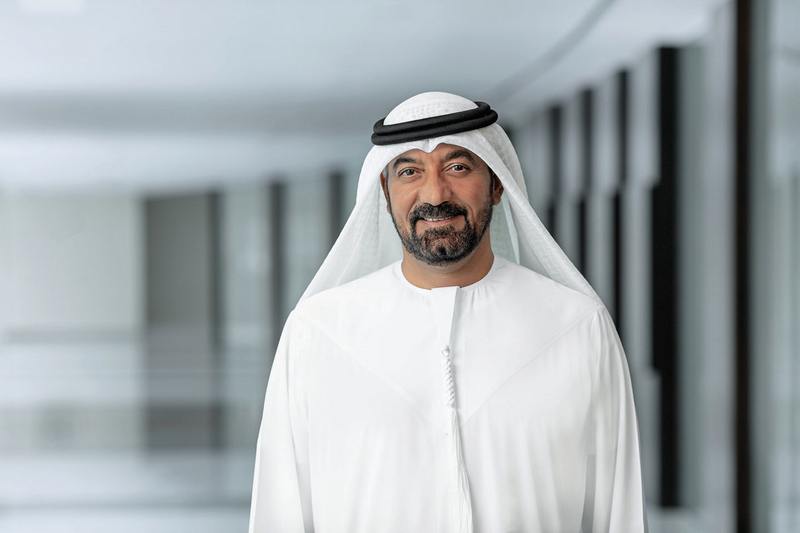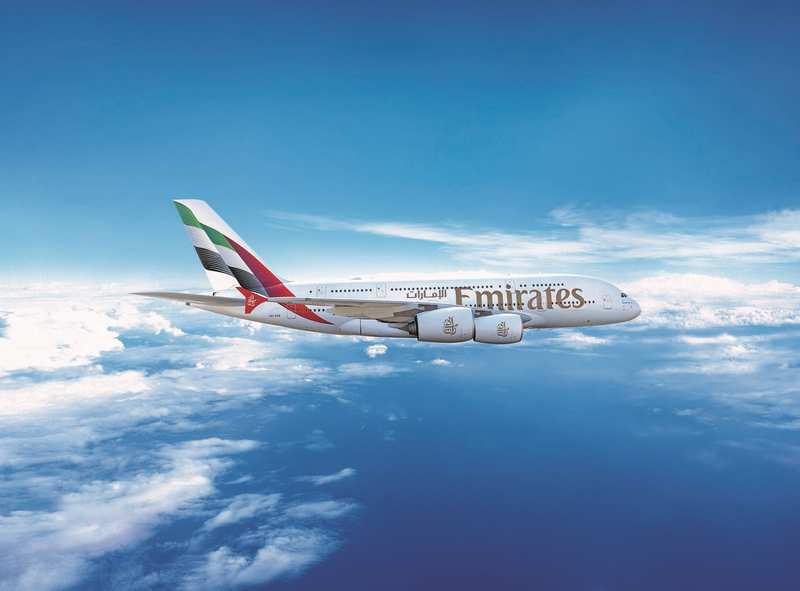
Emirates Group announces 2022-23 results
Group reports annual profit of AED 10.9 billion (US$ 3.0 billion), a new profit and revenue record and a significant turnaround from last year
- Group revenue of AED 119.8 billion (US$ 32.6 billion) increased by 81% with strong customer demand worldwide with almost all travel restrictions removed.
- Ends year with highest-ever cash balance of AED 42.5 billion (US$ 11.6 billion).
- The Group has declared a dividend of AED 4.5 billion (US$ 1.2 billion) to its owner ICD, Investment Corporation of Dubai.
- Repays AED 3.0 billion (US$ 817 million) of debt raised during COVID-19 crisis, partly ahead of maturity.
- Chairman credits the Group’s record performance and ongoing success to HH Sheikh Mohammed bin Rashid Al Maktoum’s leadership and Dubai’s progressive policies.
Emirates reports its most profitable year ever with a profit of AED 10.6 billion (US$ 2.9 billion) compared with AED 3.9 billion (US$ 1.1 billion) loss in the previous year
- Revenue up 81% to AED 107.4 billion (US$ 29.3 billion), as airline restored its global network and reinstated more passenger flights.
- Airline capacity increased by 32% to 48.2 billion ATKMs, with two new 777 freighter aircraft added to its fleet.
dnata reports a profit of AED 331 million (US$ 90 million), a solid growth from its AED 110 million (US$ 30 million) profit last year
- Revenue increased by 74% to AED 14.9 billion (US$ 4.1 billion), reflecting the ongoing pandemic recovery across all business divisions in the UAE and worldwide.
- Expands global footprint with launch of operations in Zanzibar, Tanzania; new cargo operations in Germany and Canada, and acquiring full ownership of ground handling operations in Brazil.
DUBAI, UAE,May 2023 – The Emirates Group today released its 2022-23 Annual Report, reporting its most profitable year ever on the back of strong demand across its businesses.
Emirates achieved new record profits, a complete turnaround from its loss position last year.
Both Emirates and dnata saw significant revenue increases in 2022-23 as the Group expanded its air transport and travel-related operations following the removal of nearly all pandemic-related restrictions around the world.
For the financial year ended 31 March 2023, the Emirates Group posted a record profit of AED 10.9 billion (US$ 3.0 billion) compared with an AED 3.8 billion (US$ 1.0 billion) loss for last year. The Group’s revenue was AED 119.8 billion (US$ 32.6 billion), an increase of 81% over last year’s results. The Group’s cash balance was AED 42.5 billion (US$ 11.6 billion), the highest ever reported, up 65% from last year mainly due to strong demand across its core business divisions and markets.
HH Sheikh Ahmed bin Saeed Al Maktoum, Chairman and Chief Executive, Emirates airline and Group, said: “We’re proud of our 2022-23 performance which is not only a full recovery, but also a record result. This achievement would not have been possible without HH Sheikh Mohammed bin Rashid Al Maktoum, UAE Vice President and Prime Minister, and Ruler of Dubai, whose leadership has been critical to our success today and through the years. The architect of Dubai’s progressive economic policies, HH Sheikh Mohammed is also the engine behind the Emirates Group’s trajectory. Without his drive and support, Emirates will be half the size of what we are today.”

He added: I’m proud of the Emirates Group’s performance for 2022-23, and our contribution to the restoration of air transport and tourism across the markets we serve, including Dubai’s astounding 97% year-on-year growth in international visitors for 2022. The Group is the biggest player in the UAE’s aviation sector, which supports over 770,000 jobs and generates an estimated contribution to GDP of over US$ 47 billion (AED 172.5 billion). With our growth plans, and in line with the Dubai Economic Agenda D33, we expect to significantly increase our contribution to the UAE’s GDP over the next decade through direct and indirect employment, supply chain spending, tourism spend, and trade and commerce benefits from the movement of cargo.”
Commenting on the Group’s 2022-23 turnaround performance, Sheikh Ahmed said: “We had anticipated the strong return of travel, and as the last travel restrictions lifted and triggered a tide of demand, we were ready to expand our operations quickly and safely to serve our customers. Our ongoing investments in our brand, and in our products and services, helped drive customer preference and position us favourably in the market. As a result, we have delivered a record financial performance and cash balance for our financial year 2022-23. This reflects the strength of our proven business model, our careful forward planning, the hard work of all our employees, and our solid partnerships across the aviation and travel ecosystem.”
To support expanded operations and to bolster the Group’s future capabilities, Emirates and dnata ramped up recruitment activity across the globe during the year. As a result, the Group’s total workforce increased by 20% to 102,379 employees, representing over 160 different nationalities.
In 2022-23, the Group collectively invested AED 7.2 billion (US$ 2.0 billion) in new aircraft, facilities, equipment, companies, and the latest technologies to position the business for future growth. Our commitments include: a massive multi-billion dollar aircraft cabin retrofit programme; an order for 5 new 777 freighters; the building of a new pilot training centre; the opening of Bustanica, the world’s largest vertical farm in Dubai under a partnership with CropOne; new training aircraft for its cadets at Emirates Flight Training Academy; dnata’s acquisition of 30% shares to gain full ownership of its ground handling operations in Brazil; and the building of a new advanced cargo facility in Erbil, Iraq.
The Emirates Group also continued to progress on its sustainability journey during the year. Notably, it signed up to the United Nations Global Compact, a voluntary initiative where Emirates and dnata will work towards making the UN Sustainable Development Goals (SDGs) and Principles part of their strategy, culture, and operations. The Group also signed the UAE Gender Balance Council’s pledge to increase female representation at mid-senior management positions to 30% across the country by 2025.
Amongst its numerous environmental initiatives, a key highlight for Emirates was the successful conduct of a demonstration flight with 100% sustainable aviation fuel (SAF) in one engine of a Boeing 777. This first-in-region initiative contributes to collective industry data and efforts to enable a future of 100% SAF flying. dnata in 2022-23 pledged to invest US$ 100 million (AED 367 million) over 2 years, to improve environmental efficiency across its global business, supporting its goal to reduce its carbon footprint by 50% by 2030.
During the year, the Group supported various community and humanitarian initiatives across its markets including relief efforts for the floods in Pakistan and the earthquake in Turkey and Syria. It also continued to participate in innovation incubators, and support programmes that build a pipeline of skilled aviation talent and develop future solutions for the industry.
Sheikh Ahmed said: “In 2022-23, we’ve not only brought back most of our operations but also grew our footprint and capabilities by investing in people, product, and new technologies – demonstrating our agility and ability. We continue to lay strong foundations for future success and join hands with partners to grow our business and to collaborate on innovative solutions for travel and aviation. As our business expands, so does our ability to make a positive impact on the communities we serve. We are steadfast in our commitment to deliver value to our customers and stakeholders while minimising our environmental impact.
“We go into 2023-24 with a strong positive outlook and expect the Group to remain profitable. We will work hard to hit our targets while keeping a close watch on inflation, high fuel prices, and political and economic uncertainty.”
Emirates performance
Emirates’ total passenger and cargo capacity increased by 32% to 48.2 billion ATKMs in 2022-23, as the airline continued to reinstate passenger services across its network in line with the lifting of pandemic-related flight and travel restrictions.
In addition to launching services to Tel Aviv, Emirates relaunched flights to six destinations and increased operations to 62 cities across its network throughout the year to serve strong customer demand. By 31 March 2023, the Emirates network comprised 150 destinations across six continents, including 9 cities served by its freighter fleet only.
Emirates also deployed its flagship A380 aircraft to even more cities during the year, bringing its A380 network to 43 destinations as of 31 March 2023.
Enabling its customers access even more destinations, Emirates signed agreements with new codeshare partners in 2022-23 most notably with United Airlines and Air Canada, expanding the airline’s connectivity in the Americas to over 200 new points, in addition to mutual frequent flyer programme benefits. Emirates also reinforced its strategic partnerships with Qantas and flydubai and added new interline and codeshare partners: Airlink, AEGEAN, ITA Airways, Air Tanzania, Bamboo Airways, Batik Air, Philippine Airlines, Royal Air Maroc and Sky Express.
Emirates received two new 777 freighter aircraft during the financial year. It also phased out 4 older aircraft comprising of 2 A380, 1 Boeing 777-300ERs and 1 Freighter. Its total fleet count at the end of March was 260 units, with a youthful average fleet age of 9.1 years.
Emirates’ order book stands at 200 aircraft, including 5 additional Boeing 777-300ER freighter orders announced during 2022-23. The airline’s long-standing strategy of operating modern and efficient aircraft remains unchanged, a commitment which underpins its Fly Better brand promise as a young fleet is better for the environment, better for operations, and better for customers.
With significantly enhanced capacity deployment across most markets, Emirates’ total revenue for the financial year increased 81% to AED 107.4 billion (US$ 29.3 billion). Currency fluctuations in some of the airline’s major markets, notably the Euro, Pound Sterling, and devaluation of the Pakistani Rupee, significantly impacted the airline’s profitability negatively by AED 4.5 billion (US$ 1.2 billion).
Total operating costs increased by 57% from last financial year. Cost of ownership (depreciation and amortisation) and fuel cost were the two biggest cost components for the airline in 2022-23, followed by employee cost. Fuel accounted for 36% of operating costs compared to 23% in 2021-22. The airline’s fuel bill increased by 143% to AED 33.7 billion (US$ 9.2 billion) compared to the previous year, due to a higher uplift of 49% in line with capacity expansion and a higher average fuel price which was up by 48%.
With the removal of pandemic-related travel restrictions globally, the airline substantially improved its financial results and reported a record profit of AED 10.6 billion (US$ 2.9 billion) after last year’s AED 3.9 billion (US$ 1.1 billion) loss, and an exceptional profit margin of 9.9%, reflecting the best performance in the airline’s history.
Emirates carried 43.6 million passengers (up 123%) in 2022-23, with seat capacity up by 78%. The airline reports a Passenger Seat Factor of 79.5%, compared with last year’s passenger seat factor of 58.6%; and a 7% increase in passenger yield to 37.5 fils (10.2 US cents) per Revenue Passenger Kilometre (RPKM), due to a change in cabin and route mix, fares and currency.
Emirates continued to invest in delivering ever better customer experiences. During the year, it launched its full Premium Economy experience to hugely positive customer feedback, brought into service the first 6 of its newly retrofitted A380s with completely refreshed cabin interiors, and opened ‘Emirates World’ – a modern concept retail store which will gradually be introduced to other key markets. It also announced a US$ 350 million investment in new generation inflight entertainment systems for its A350 fleet.
With a continued focus on digital initiatives to provide customers with speedy and secure journeys, Emirates also signed a landmark biometric data agreement with the General Directorate of Residency and Foreigners Affairs in Dubai to fast-track travellers’ journey on arrival.
Emirates SkyCargo delivered a solid performance, contributing 16% of the airline’s revenue despite a reduction in available capacity as aircraft that were temporarily converted into “mini freighters” during the pandemic returned to full passenger service.
In 2022-23, Emirates’ cargo division reinforced its leadership in cool chain transport, building on the advanced expertise and infrastructure that made it the carrier of choice for the transport of temperature sensitive medicines during the pandemic, and other perishable items.
Emirates SkyCargo maintained its edge in the global airfreight industry by focusing its customers, bringing innovative solutions to the market, and leveraging its fleet and network capabilities. During the year, the cargo division signed commercial MoUs with United Airlines and Air Canada to expand its network reach and capacity for customers; introduced a new digital channel, WebCargo, for customers to directly access and book its flights for their cargo shipments; and launched Emirates Delivers UK, expanding its e-commerce shipping solution to UAE customers.
Emirates SkyCargo also deployed its expertise and capacity to transport relief goods to Pakistan, Turkey and Syria in partnership with Dubai’s International Humanitarian City.
With steady air freight demand throughout the year, Emirates’ cargo division reported a solid revenue of AED 17.2 billion (US$ 4.7 billion). This was a 21% decline over last year’s exceptional performance caused by the pandemic.
Freight yield per Freight Tonne Kilometre (FTKM) increased by 3% despite more cargo capacity returned to the global market, but generally remained at high levels compared to the pandemic marketplace due to steady and strong demand.
Tonnage carried declined by 14% to reach 1.8 million tonnes, due to the reduction in available freighter capacity for the entire year with the reinstatement of more passenger services. At the end of 2022-23, Emirates’ SkyCargo’s total freighter fleet stood at 11 Boeing 777Fs.
Emirates’ hotels portfolio revenue over last year increased by 12% to AED 675 million (US$ 184 million) reflecting the uptick in tourism traffic, particularly to Dubai.
Emirates has consistently demonstrated the ability and commitment to fulfil its contractual obligations. In addition to repaying aircraft related financing liabilities as they fall due, it successfully repaid AED 3.0 billion (US$ 817 million) more of the total AED 17.5 billion (US$ 4.8 billion) raised during the COVID-19 crisis. This assurance continues to strengthen the confidence of its financing partners in its business model and allowed Emirates to reprice AED 4.5 billion (US$ 1.2 billion) of debt during this financial year and further raise AED 1.2 billion to finance the acquisition of two new B777 freighter aircraft through an Islamic finance lease at highly effective margins.
In the face of rising interest rates, Emirates adeptly managed its net exposure and effectively mitigated the impact of rate fluctuations on the bottom line. Additionally, the proactive currency risk management programme ensured ongoing financial stability and resilience by employing a range of hedging strategies including forward contracts and natural hedges.
Emirates closed the financial year with an exceptional level of cash assets of AED 37.4 billion (US$ 10.2 billion), 79% higher compared to 31 March 2022.
dnata performance
Recovery from the pandemic was felt across almost all dnata businesses, and in 2022-23 dnata increased its profit by 201% to AED 331 million (US$ 90 million).
With growing flight and travel activity across the world, dnata’s total revenue increased by 74% to AED 14.9 billion (US$ 4.1 billion). dnata’s international businesses account for 72% of its revenue, an increase of 10%pts from the previous year. Through the year, dnata worked closely with its customers through the challenges of labour shortages and rising inflation in its major markets such as UK, US, Europe and Australia.
Laying the foundations for future growth, dnata’s investments in 2022-23 amounted to AED 467 million (US$ 127 million). Significant investments during the year included: a new cargo centre in Amsterdam, the Netherlands; new modern cargo and ground service equipment facilities in Erbil, Iraq; the global roll-out of its advanced “OneCargo” system to digitise and automate business functions; the expansion of marhaba operations in Dubai and Zanzibar; and the re-opening of renovated catering facilities in Sydney with energy efficient installations and equipment upgrades.
In 2022-23, dnata’s operating costs increased by 74% to AED 14.6 billion (US$ 4.0 billion), in line with expanded operations in its Airport Operations, Catering and Travel divisions and impacted by inflationary pressure across all markets mainly for labour and food supply.
dnata’s cash balance improved by more than AED 200 million to AED 5.1 billion (US$ 1.4 billion). Net cash used in financing activities, primarily payments for loans and leases, amounted to AED 906 million (US$ 247 million), while the business utilised net cash of AED 528 million (US$ 144 million) in essential investing activities. The business saw a positive operating cash flow of AED 1.4 billion (US$ 381 million) in 2022-23, a reflection of the substantial improvements in revenue.
Revenue from dnata’s Airport Operations, including ground and cargo handling increased to AED 7.2 billion (US$ 2.0 billion).
The number of aircraft turns handled by dnata globally grew by 35% to 712,383, cargo handled declined by 8% to 2.7 million tonnes, reflecting the increased flight activity across markets as the last pandemic restrictions lifted and dnata’s customers reinstated services.
During 2022-23, dnata launched its ground handling operations at the newly built terminal of Zanzibar Abeid Amani Karume International Airport, together with Emirates Leisure Retail (ELR) and MMI as master concessionaire for all food and beverage, duty free and commercial outlets at the terminal. It also expanded operations in Canada, partnering GTA Group to offer quality and safe cargo services in Calgary and Vancouver.
dnata’s Catering & Retail business accounted for AED 4.8 billion (US$ 1.3 billion) of dnata’s revenue, up by 187%. The inflight catering business uplifted 111.4 million meals to airline customers, almost three times the number of meals from last year, as its airline customers across the world restored their flight operations.
dnata’s Catering & Retail division substantially increased production to support airlines to restart their flight operations after the pandemic particularly in Australia, and its key markets of UK and the USA. It also worked extensively with its customers on flexing their menus to address supply chain issues and food inflation.
In the UAE, Alpha Flight Services (Alpha), dnata’s subsidiary, signed a concession agreement under which it will provide flight catering services to over 10 airlines at Ras Al Khaimah International airport, operate three F&B outlets, as well as the airport lounge.
Notable contract wins for the catering division in 2022-23 include: multi-year catering contracts with Australia’s newest airline, Bonza, and with Air India for its flights in London, Birmingham, and Milan; contracts with United Airlines and Edelweiss Air for their flights in Jordan; and with Lufthansa and Swiss International Air Lines in Singapore.
Revenue from dnata’s Travel Services division grew by 227% to AED 2.3 billion (US$ 618 million). The reported total transaction value (TTV) of travel services sold increased by 203% to AED 7.0 billion (US$ 1.9 billion), a substantial growth from last year. This reflects last year’s abnormal situation where the business was recovering from COVID-19-related booking cancellations.
In 2022-23, dnata Representation Services boosted its existing customer service support for Lufthansa in Europe and grew its relationship with American Airlines by providing a range of sales and marketing services to the carrier as its general sales agent in India. dnata became the preferred travel partner in the Middle East for American Express Global Business Travel, the world’s leading B2B travel platform; and enhanced its long-standing partnership with Club Med to bring tailor-made, all-inclusive holidays at exclusive rates closer to the GCC travellers.
In the UAE, dnata expanded its retail footprint with the opening of a new travel store in Dubai Hills. Reflecting the increased visitor numbers and demand for Dubai experiences, Arabian Adventures expanded and enhanced its popular ‘Overnight Safari’ experience in the Dubai Desert Conservation Reserve and re-launched an enhanced edition of its signature Jeep Adventure Safari.
dnata’s leisure wholesale specialist, Yalago, expanded its global in-markets teams, and recorded a 92% year on year increase in hotel bookings in 2022. The full 2022-23 Annual Report of the Emirates Group – comprising Emirates, dnata and their subsidiaries – is available at: www.theemiratesgroup.com/annualreport






